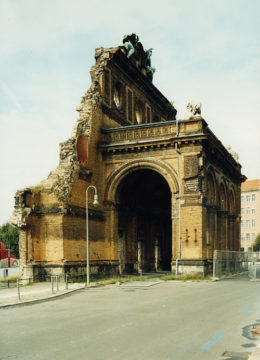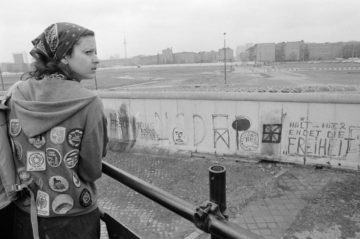by Andrea Scrima
Sequel to the essay “Musings on Exile, Immigrants, Pre-Unification Berlin, Trauma, Naturalization, and a Native Tongue.”

It’s disorienting when cities lose their gray zones—the undefined plots of fallow land that used to line the banks on the Brooklyn side of the East River, for instance, the nineteenth-century warehouses, docks, and quietly deteriorating, decommissioned refineries. Crumbling cement made porous by weather and weeds, the whole of it replaced now by faceless, blue-hued high-rise towers of glass and steel that sprang up like mutant mushrooms over the past decade and a half to block the path of the evening sun along the waterfront, erase the sharp glint of silvery light that once illuminated defunct railroad tracks at sundown, their perfectly parallel lines momentarily ablaze with the recollection of past importance. In Berlin, wasteland terrains could be found nearly everywhere before the Wall came down: the long stretch of a discontinued S-Bahn line that led from Monumentenstrasse and over the bridges at Yorckstrasse up to the former railway terminus Anhalter Bahnhof, now a ruin consisting of no more than a fragment of the once-massive building’s façade, where a semicircular set of overgrown train tracks opened onto the remains of a round loading dock. A decade and a half after Allied bombs had obliterated much of Germany, its division into two countries produced a haphazard border that sliced through the massive reconstruction project underway, blocking streets and cutting through buildings and canals and occasionally giving rise to little pockets of land connected to West Berlin by long roads flanked on either side by the Wall. Read more »

 I moved to Berlin in 1984, but have rarely written about my experiences living in a foreign country; now that I think about it, it occurs to me that I lived here as though in exile those first few years, or rather as though I’d been banished, as though it hadn’t been my own free will to leave New York. It’s difficult to speak of the time before the Wall fell without falling into cliché—difficult to talk about the perception non-Germans had of the city, for decades, because in spite of the fascination Berlin inspired, it was steeped in the memory of industrialized murder and lingering fear and provoked a loathing that was, for some, quite visceral. Most of my earliest friends were foreigners, like myself; our fathers had served in World War II and were uncomfortable that their children had wound up in former enemy territory, but my Israeli and other Jewish friends had done the unthinkable: they’d moved to the land that had nearly extinguished them, learned to speak in the harsh consonants of the dreaded language, and betrayed their family and its unspeakable sufferings, or so their parents claimed. We were drawn to the stark reality of a walled-in, heavily guarded political enclave, long before the reunited German capital became an international magnet for start-ups and so-called creatives. We were the generation that had to justify itself for being here. It was hard not to be haunted by the city’s past, not to wonder how much of the human insanity that had taken place here was somehow imbedded in the soil—or if place is a thing entirely indifferent to us, the Earth entirely indifferent to the blood spilled on its battlegrounds.
I moved to Berlin in 1984, but have rarely written about my experiences living in a foreign country; now that I think about it, it occurs to me that I lived here as though in exile those first few years, or rather as though I’d been banished, as though it hadn’t been my own free will to leave New York. It’s difficult to speak of the time before the Wall fell without falling into cliché—difficult to talk about the perception non-Germans had of the city, for decades, because in spite of the fascination Berlin inspired, it was steeped in the memory of industrialized murder and lingering fear and provoked a loathing that was, for some, quite visceral. Most of my earliest friends were foreigners, like myself; our fathers had served in World War II and were uncomfortable that their children had wound up in former enemy territory, but my Israeli and other Jewish friends had done the unthinkable: they’d moved to the land that had nearly extinguished them, learned to speak in the harsh consonants of the dreaded language, and betrayed their family and its unspeakable sufferings, or so their parents claimed. We were drawn to the stark reality of a walled-in, heavily guarded political enclave, long before the reunited German capital became an international magnet for start-ups and so-called creatives. We were the generation that had to justify itself for being here. It was hard not to be haunted by the city’s past, not to wonder how much of the human insanity that had taken place here was somehow imbedded in the soil—or if place is a thing entirely indifferent to us, the Earth entirely indifferent to the blood spilled on its battlegrounds. 